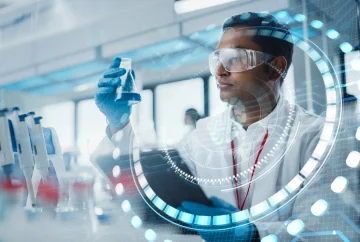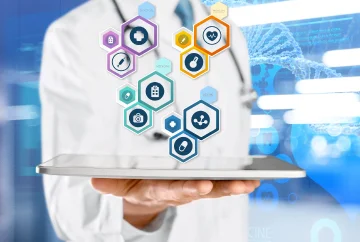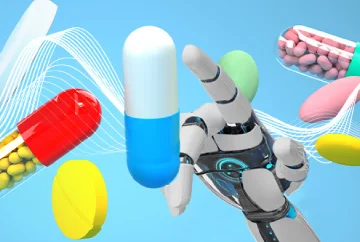Generative AI for Lifesciences & Healthcare Industry
Biotechnology & Patient Care: Generative AI can revolutionize the fields of life sciences and healthcare in such areas as Protein Sequence Design, Protocol Optimization, Medical Legal Review, Diagnostic Accuracy, Synthetic Data Generation, and Sales Force Training. However, the successful integration of LLMs requires addressing challenges and considerations specific to the life sciences domain and ensuring the utilization of best practices such as prompt engineering, fine-tuning, and reinforcement learning from human feedback.
Medical Manufacturing: Generative AI is a powerful creative tool in the manufacturing industry. It enables designers to simulate various product designs with different objective weightings. Plans can be to satisfy specific criteria such as cost efficiency, enhanced performance, or durability.
Generative AI can be effectively developed, validated, and integrated into the life sciences value chain by adopting a multifaceted approach, using domain-specific data, and fostering interdisciplinary collaboration. These mechanisms can ensure that LLMs improve product design and manufacturing quality to enhance patient care and improve outcomes from bench to bedside.
Opportunities in the Health Sciences industries
Healthcare, Pharma, and Medical Devices companies are evaluating the innovative technology and exploring business use cases to apply this technology as there is a vast potential for Generative AI to help improve patient care and experience, clinical decision-making, reduce healthcare professional workload, speed up medical research and enhance operational efficiency. One of the near-term opportunities lies in the potential to automate documentation and reporting work done by physicians and nurses in clinical and research scenarios. Some notable early use cases are:
- Medical Notetaking: Generative AI can streamline and automate the medical notetaking process by capturing the critical facts from patient conversations and summarizing them as physicians' notes in Electronic Health Records. It can also translate and create clinical notes such as visit summaries, discharge notes, radiology reports, or pathology reports. The technology can also simplify complex medical language into summaries and translate them into any language so patients can understand easily.
- Clinical Decision Support: Generative AI can assist doctors and medical professionals in making accurate and informed diagnoses and suggest treatment options by analyzing data from a patient's medical records, lab results, previous treatments, and medical imaging, such as MRIs (Magnetic Resonance Imaging) and X-rays. It can also help in patient education by addressing queries related to disease and treatment.
- Telemedicine and Remote Patient Monitoring:ChatGPT-based virtual assistants can help patients schedule appointments, receive treatment, and manage their health information. Moreover, it can remotely oversee patients by scrutinizing information gathered from wearables, sensors, and other monitoring devices, providing healthcare providers with instantaneous insights into their patients' health conditions.
- Medical Information and Education: Patients can communicate with ChatGPT using natural language and ask drug-related questions, including dosage, side effects, and interactions. ChatGPT can also provide students and healthcare professionals instant access to the latest research, guidelines, and practices, thus supporting their ongoing learning and development.
- Drug Discovery: The use of Genai can accelerate the drug discovery and development process. By searching through the medical and scientific literature on websites such as PubMed or clinicaltrials.gov, potential drug candidates can be identified and tested for effectiveness using computer simulations (in silico) before proceeding to clinical trials on animals and humans.
- Drug Development: Genai can design clinical trials and author protocol documents. It can also create Clinical study reports by generating summaries of clinical trials, including the study design, patient characteristics, efficacy and safety results, and statistical analyses, significantly reducing the time and effort required to compile this information manually.
- Medical devices Submissions: Genai can automatically create the necessary Premarket Approval (PMA) application or a Premarket Notification 510(k) for FDA (Food and Drug Administration) Submission by creating labeling documentation.
- Medical Device Predictive Maintenance: By analyzing data from medical devices, such as imaging equipment or ventilators, Genai algorithms can predict when maintenance is necessary. Helping healthcare providers activate their supply chain processes earlier to proactively maintain their equipment and reduce the risk of equipment failure.
- Synthetic Medical Data: Genai can help generate synthetic patient-level medical data that is realistic to train machine learning models without the risk of exposing confidential information about actual patients.
Barrier and Challenges
While the potential of this technology is considerable, it is crucial to recognize that it is in a continuous state of development and faces inherent technical challenges and regulatory complexities. Current limitations include the computer power required for LLMs to function, which is often costly. LLMs also require vast volumes of data to be trained effectively, as the output accuracy of Genai is highly dependent on the quality of the datasets used to teach them, including medical records, lab results, and imaging studies.
Any AI-generated diagnosis and treatment plan error could risk the patient's health. A regulatory framework is vital to ensure the responsible and ethical use of Genai in healthcare while safeguarding patient safety. Developing these frameworks will take time and require collaboration between industry, regulators, and other stakeholders.
Current Trends & Outlook
While most companies are still exploring and evaluating the technology, some have gone beyond exploration and started using ChatGPT in real-world scenarios. This trend of healthcare companies leveraging the capabilities of large language models (LLMs) is likely to continue and grow exponentially, particularly in areas that do not directly impact patient health, such as notetaking and document creation.
Core Principles for Gen AI that experts can adopt for Lifesciences & Healthcare
Generative AI (Gen AI) solutions must follow several fundamental principles to deliver effective and responsible AI-powered products and services:
- Ethical and Responsible AI: Providers of General AI prioritize ethical considerations and responsible usage of AI. They guarantee that their solutions adhere to ethical guidelines, comply with legal regulations, and eliminate biases or discriminatory practices.
- Data Privacy and Security: Safeguarding user data and ensuring its security are paramount. Companies must implement robust data privacy measures, such as data encryption, access controls, and compliance with data protection regulations like GDPR (General Data Protection Regulation).
- Transparency: Openness in AI operations is essential. Companies must disclose information about their data sources, model architectures, and the processes behind their AI systems. This transparency fosters trust among clients and users.
- Customization: Versatile and customizable, General AI solutions suit the distinct requirements of every client. Providers collaborate closely with customers to tailor models and outputs for specific use cases and industries.
- Continuous Learning and Improvement: Providers of General AI solutions must invest in ongoing research and development to continually enhance their models. They integrate user feedback to enhance AI systems, ensuring their continuous advancement at the forefront of technology.
- Interoperability: Companies offering General AI solutions should strive for compatibility with existing systems and tools. They need to facilitate integration with other software and platforms to maximize the value of AI in a broader context.
- User-Centric Design: Emphasizing user experience and usability is paramount. General AI solutions should be user-friendly, enabling non-technical users to leverage the power of AI.
- Scalability: Scalability ensures that AI remains effective as organizations’ use of the technology continues to expand.
- Educational Support: Companies should provide educational resources and training to help clients and users understand how to effectively use General AI, interpret its outputs, and make informed decisions.
- Feedback Loop: Providers of General AI should strive to establish mechanisms for receiving user feedback and promptly addressing issues. This iterative feedback loop helps refine AI models and enhance performance over time.
- Diversity and Inclusion: Ensuring diversity in data and model training is crucial to prevent bias. Companies strive to make their AI systems inclusive and non-discriminatory.
- Sustainability: Some General AI providers prioritize sustainability by optimizing algorithms and data centers for energy efficiency, contributing to an eco-friendly AI ecosystem.





